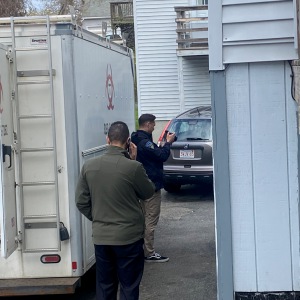Beacon Hill Roll Call: March 18 to March 22, 2024

An electric vehicle charging station in Turners Falls. The House gave initial approval to a bill that would prevent condominium associations, neighborhood conservation districts and historic district commissions from prohibiting or unreasonably restricting owners from installing electric vehicle charging equipment in or near an owner’s parking space. STAFF FILE PHOTO/DAN LITTLE
| Published: 03-29-2024 12:07 PM |
Beacon Hill Roll Call records local senators’ votes on roll calls from the week of March 18 to March 22. There were no roll calls in the House last week.
The Senate, 40-0, approved a proposal that would prohibit the posting of sexually explicit images of another person online without their permission — commonly referred to as “revenge porn.” The practice is often used by ex-spouses or ex-partners.
Massachusetts is one of only two states that does not have a law about this crime. The measure makes it illegal and establishes a sentence of up to 2.5 years in prison and/or a fine of up to $10,000; increases the upper limit of the fine for criminal harassment from $1,000 to $5,000; and allows a victim to petition the court for a harassment prevention order against a person who has violated this statute.
Another provision changes current law under which minors, under 18 years of age, who share explicit images of themselves or other minors, can be charged with violating Massachusetts child pornography laws and are required to register with the Sex Offender Registry. The bill allows minors to be diverted to an education program that would provide them with information about the consequences of posting or transmitting indecent visual depictions of minors.
“With passage of this bill today we take another step toward closing a loophole in our laws that has caused pain, anguish, embarrassment and a sense of helplessness to those survivors who for so long suffered in silence, without justice,” said chief sponsor Sen. John Keenan, D-Quincy. “I am deeply grateful to those who shared their stories and advocated for change to ensure others would not have to suffer as they have. For every case we know of, countless others remain hidden, so I hope passage of this legislation by the Senate will soon lead to the bill being signed into law by the governor. Most importantly, I hope it will provide some closure for survivors and their loved ones and send a clear message that there will be consequences for such conduct.”
“I am proud that the Senate has passed comprehensive legislation to prevent abuse and exploitation,” said Sen. Jamie Eldridge, D-Marlborough, Senate chair of the Judiciary Committee. “The rise of new technology has created a reality in our society where it is easy to cause great harm and significant trauma to people, and Massachusetts needs to take action to better protect victims and prevent such disturbing actions from happening. We also need to provide more tools to protect people in a relationship from being psychologically abused through coercive control, with a growing recognition of the many ways that a partner or family member can cause emotional harm.”
The House has already approved a different version of the bill and a House-Senate conference committee will likely work out a compromise version.
A “Yes” vote is for the bill.
Article continues after...
Yesterday's Most Read Articles
 Authorities ID victim in Greenfield slaying
Authorities ID victim in Greenfield slaying
 State records show Northfield EMS chief’s paramedic license suspended over failure to transport infant
State records show Northfield EMS chief’s paramedic license suspended over failure to transport infant
 Police report details grisly crime scene in Greenfield
Police report details grisly crime scene in Greenfield
 New buyer of Bernardston’s Windmill Motel looks to resell it, attorney says
New buyer of Bernardston’s Windmill Motel looks to resell it, attorney says
 McGovern, Gobi visit development sites in Greenfield, Wendell
McGovern, Gobi visit development sites in Greenfield, Wendell
 High schools: Seventh-inning rally helps Turners Falls softball edge Frontier 6-3 (PHOTOS)
High schools: Seventh-inning rally helps Turners Falls softball edge Frontier 6-3 (PHOTOS)
Sen. Joanne Comerford — Yes
Sen. Paul Mark — Yes
The Senate, 32-8, approved a supplemental budget that includes an additional $250 million in funding for the Emergency Assistance Program that funds the emergency family shelter system.
The bill requires each family in shelter to receive an individualized rehousing plan. It makes eligibility for shelter after nine months contingent upon compliance with the rehousing plan, with certain categorical exemptions. It would also allow officials to award one or more 90-day extensions to shelter residents who meet certain criteria, such as veterans, the disabled, single parents of children with disabilities or those who need an extension to avoid losing a job.
Other provisions keep in place some pandemic-era programs, set to expire, including allowing restaurants to sell beer, wine and cocktails for takeout and expanding outdoor dining.
“The plan passed by the Senate today addresses the state’s fiscal reality while also treating individuals who have migrated to our state with dignity and respect,” said Senate President Karen Spilka, D-Ashland. “As we continue to navigate through a challenge that has landed on our doorstep because of Congressional inaction, today we are addressing the immediate need to house families, bolstering our existing efforts to support those who have immigrated here in becoming part of our workforce, and providing a roadmap to manage this effort over time.”
“The Senate recognized the necessity of continuing to proactively respond swiftly and decisively to meet this unprecedented humanitarian emergency shelter crisis head-on, by not only providing the requisite funds to address this crisis, but also provide a long-term framework to transition these families out of temporary shelters and into permanent housing,” said Sen. Mike Rodrigues, D-Westport, chair of the Senate Committee on Ways and Means. “With $250 million in emergency funding for fiscal year 2024, we can weather this challenge as we develop solutions for rehousing families, provide workforce opportunities and integrate these children into our public school system.
“I voted ‘no’ on the supplemental budget because the right-to-shelter law is costing the commonwealth $3 million a day to house, feed, protect and educate or provide child care services to individuals and families who are not our residents,” said Sen. Ryan Fattman, R-Sutton.
“Our emergency shelter program was never meant to handle the number of individuals it is housing today and the federal government, who has the sole authority to handle this immigration crisis and provide financial relief to states, is nowhere to be found,” said Sen. John Velis, D-Westfield, who also voted against the measure. “As the demand for the program continues at this unsustainable rate, we simply cannot continue to fund this ourselves without jeopardizing countless critical programs that we hold dear.”
Sen. Bruce Tarr, the chief opponent of the bill, did not respond to repeated requests by Beacon Hill Roll Call asking him to explain why he voted against it.
A “Yes” vote is for the budget.
Sen. Joanne Comerford — Yes
Sen. Paul Mark — Yes
The Senate, 8-31, rejected an amendment that would require resettlement agencies to consult on a monthly basis with the Governor’s Executive Office of Housing and Livable Communities to ascertain the projected availability of space in the state’s shelter system. It also prohibits resettlement agencies from undertaking resettlement activity when it is foreseeable that the shelter system will exceed capacity.
“By directing resettlement agencies to work more closely with the Healey administration, [the amendment] would have helped the commonwealth better forecast its shelter capacity and ensure that we always have space for those who need it most,” said Sen. Mike Moore, D-Millbury, who voted in favor of the amendment. “I believe this would’ve been key to ensuring that our emergency shelter system is not overrun and that we can keep costs from spiraling out of control.”
Opponents said the amendment is unnecessary. They argued the resettlement agencies do a great job and should not be handcuffed and tied up with the bureaucracy.
Sen. Bruce Tarr, R-Gloucester, the sponsor of the amendment, and Sen. Cindy Friedman, D-Arlington, who opposed the amendment, did not respond to repeated requests by Beacon Hill Roll Call asking them to explain why they voted the way they did.
A “No” vote is against the amendment.
Sen. Joanne Comerford — No
Sen. Paul Mark — No
The Senate, 12-27, rejected an amendment that would require the state take into account an individual’s length of residency in Massachusetts when determining priority in securing emergency shelter.
“While this amendment is not a residency requirement, it would’ve made sure those who have demonstrated a longer commitment to the commonwealth are prioritized for extended stays in the commonwealth’s emergency shelter system,” said Sen. Mike Moore, D-Millbury, who voted for the amendment. “To be clear, there are important exceptions to this rule — those who are at imminent risk of harm due to domestic violence and those who are making progress toward work authorization will not be skipped over. This strikes me as a reasonable compromise to ensure our emergency shelter system is available to Bay Staters who need it first, while preserving the spirit of the law that maintains Massachusetts as a place that is welcoming to all.”
Opponents said this would essentially create an unfair residency requirement that would have Massachusetts residents competing with each other for slots. They noted there are already reasonable provisions in the bill that prioritize pregnant women, victims of domestic abuse, work status and veterans’ status.
Sen. Bruce Tarr, R-Gloucester, the sponsor of the amendment, and Sen. Mike Rodrigues, D-Westport, who proposed the amendment, did not respond to repeated requests by Beacon Hill Roll Call asking them to explain why they voted the way they did.
A “No” vote is against the amendment giving preference to length of residency.
Sen. Joanne Comerford — No
Sen. Paul Mark — No
The Senate, 39-0, approved an amendment that would require the Executive Office of Housing and Livable Communities, in conjunction with the Executive Office of Public Safety and Security, to conduct a safety review of current safety practices and implement recommendations to reduce the risk to human life and safety.
“It is essential that state-run emergency shelters and overflow sites maintain the highest standards of safety to protect the families in our care,” said amendment sponsor Sen. Michael Moore, D-Millbury. “I’m pleased the Senate unanimously adopted this amendment to require a clear and effective safety plan at these sites.”
A “Yes” vote is for the amendment.
Sen. Joanne Comerford — Yes
Sen. Paul Mark — Yes
The House gave initial approval to a bill that would prevent condominium associations, neighborhood conservation districts and historic district commissions from prohibiting or unreasonably restricting owners from installing electric vehicle charging equipment in or near an owner’s parking space.
Restrictions that significantly increase the cost of the equipment, decrease its efficiency or effectively prohibit its installation would not be permitted. The bill would also require owners to pay the costs of installing and maintaining the charging equipment and for the costs of the electricity consumed during charging.
“As the commonwealth moves away from gas-powered vehicles, we are going to need increased access to electric vehicle charging stations,” said co-sponsor Rep. Michelle Ciccolo, D-Lexington. “With 40% of emissions coming out of our transportation systems, it is essential that we make operating an electric vehicle as seamless as owning a gas vehicle. For that reason, we can’t have local siting boards prioritize aesthetics over access to charging.”
The House gave initial approval to legislation that would designate March 10 as COVID-19 Remembrance Day to honor all the people, especially older adults and people with disabilities, who died or were stricken with COVID-19. The measure also expresses appreciation to first responders, caregivers and researchers who cared for victims or developed treatments or vaccines in response to the virus. The measure would not take effect until March of 2025 since March 10 of this year has already passed.
“I am very pleased to see action taken toward establishing COVID-19 Remembrance Day, which would honor those who have been lost to or affected by COVID,” said co-sponsor Sen. Pat Jehlen, D-Somerville. “It also acknowledges the essential workers who helped us get through the hardest times and contributed to our commonwealth’s recovery.”
“At the time of the pandemic, I was the House chair of the Joint Committee on Elder Affairs, and had an upfront seat, in a sense, to the tragedy that was unfolding, especially in our nursing homes and to aging adults, generally,” said co-sponsor Rep. Ruth Balser, D-Newton. “I feel it is important to remember those we lost and to honor those who helped keep us safe.”
The House gave initial approval to a proposal that would require banks and other mortgage lenders to provide additional information on a monthly basis to their borrowers, including the balance of principal remaining, a confirmation of the most recent payment received, the balance of any escrow accounts and a description of any payments from those escrow accounts.
“The intent of this legislation is to provide mortgage customers with the tools they need to ensure knowledge of their financial situation,” said sponsor Rep. Bruce Ayers, D-Quincy. “This bill is an easy measure that we can take to help residents achieve greater financial stability and awareness.”
The House gave initial approval to legislation that would prohibit anyone under age 21 from attending any marijuana-related event, forum, convention or conference to promote or encourage marijuana use or to educate users or prospective users on marijuana use. The measure exempts prevention programs for youth, youth educational programs or substance abuse programs related to marijuana use. Any event organizer who violates this law would be fined $2,000 but the fine would not be imposed if the organizer reasonably relied on IDs that turned out to be fake.
“This [existing] loophole contradicts laws that prohibit cannabis consumption for people younger than 21,” said sponsor Rep. Hannah Kane, R-Shrewsbury. “Closing this loophole will provide clarity and prevent youths from attending cannabis-related events.”
The House gave initial approval to legislation that would change some language in the 50-year-old law that created councils on aging in local cities and towns. Changes include deleting language that refers to “problems of the aging” and replacing it with “the needs of older adults;” deleting language that calls workers “clerks” and replacing it with language that calls workers “staff;” and adding “and delivering services” to the language in the bill that gives the council the authority to “carry out programs.”
Supporters said the bill modernizes the language in a 50-year-old law that created councils on aging at a time when there were very few senior centers. They noted that the number of councils on aging and senior centers has grown to 350 and said the bill updates the statute to reflect the modern functioning of these critical centers.
Sponsor Rep. Kate Donaghue, D-Westborough, said she is thrilled that the bill received initial approval. “I filed this bill because senior centers are integral parts of each community, serving as a resource for every older adult and providing comprehensive programming and services to support the needs of the growing number of older adults across the commonwealth.”
The House gave initial approval to a proposal that would require all public schools with grades 6-12 students to maintain free menstrual products, including sanitary napkins and tampons, in restrooms and to make them available in a “convenient manner that does not stigmatize any persons seeking the products.”
“Requiring schools to provide free menstrual products will not only reduce distractions throughout the day but will also reduce embarrassment by guaranteeing that essential health items are readily available when needed,” said sponsor Rep. Jeff Roy, D-Franklin. “Such access ensures that students can attend classes and participate in extracurricular activities without interruption. Toilet paper and paper towels are available free of charge at high schools and middle schools, and menstrual products are no less essential to a student’s well-being. No student should face any barrier, financial or otherwise, to accessing basic health essentials.”

 What are the protocols for emergency transport of infants?
What are the protocols for emergency transport of infants? Frontier Regional School students appeal to lower voting age
Frontier Regional School students appeal to lower voting age
